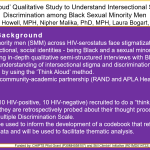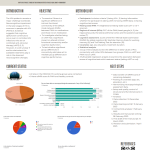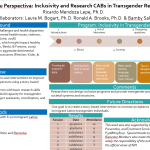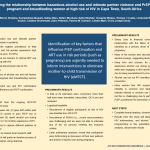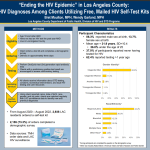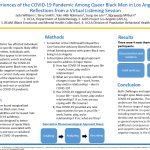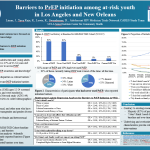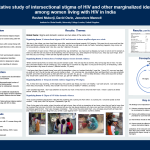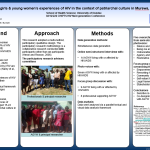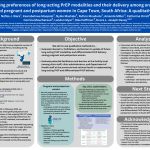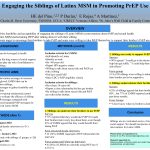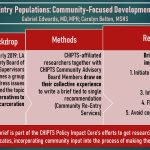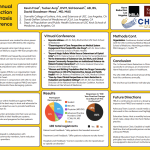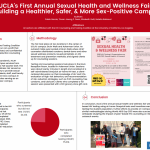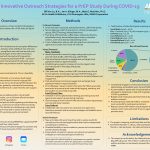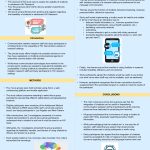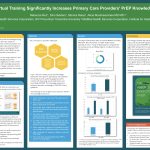General Information
The conference is free to attend and will be held in-person at UCLA Covel Commons – 330 De Neve Dr, Los Angeles, CA 90095. Registration includes breakfast and lunch.
The goal of this conference is to support the next generation of HIV researchers, HIV prevention and treatment practitioners, and service providers working towards an end to HIV/AIDS through networking and sharing visions for future priorities.
This year’s conference theme is “Innovating Interventions to Prevent HIV: Intersectionality and Syndemics.”
We welcome participation from all Southern California, national and global stakeholders and partners working to advance HIV prevention and treatment programs, policies, education, and research. The intended audience are CBO, ASO, clinic and public health department staff, community, patient and client advocates, students and trainees, and early-stage to established investigators.
———-
Abstract Information
We encourage abstracts on this theme and any of the sub-themes below to create a shared vision of priorities and partnerships to make transformational impacts on HIV prevention and treatment that are based upon CHIPTS’ four-level (behavioral, biomedical, technological, structural) framework for HIV prevention and care.
- Health Disparities and Inequities
- Homelessness, Housing and Economic Insecurity
- Mental Health Disorders and Substance Abuse
- Stigma and Discrimination
- Syndemics
- Intersectionality
- Co-Morbidities and Co-Infections
- Biomedical Prevention (PrEP/PEP)
- Continuums of Care and Prevention
- Implementation Science
- Model Partnerships and Integrated Services
- COVID-19
- Mpox (Poxvirus)
Abstracts that address social and structural determinants of health (e.g., homelessness, stigma), resilience, and protective factors to improve HIV health outcomes, and abstracts that explore the impact of disruptors and innovation on HIV prevention, substance use, and/or mental health services (e.g., expansion of telehealth, self-testing, etc.) for communities affected by HIV are strongly encouraged. Abstracts from global and local research projects are also encouraged.
———-
Abstract Submission Guidelines
To guide your abstract submission, abstracts should be between 300-600 words and feature the sections: Title, Background, Methods, Results and Conclusion
5 Ways to Participate:
- Attend: Participate in the conference to learn, share, and network.
- Present: Share program and research experiences and findings in oral or poster
- Mentor: Senior researchers and staff provide feedback on abstract drafts prior to final
- Review: Conduct peer review of abstracts for oral and poster
- Learn: Earn up to 4 hours of Continuing Education Credits for Nurses, LCSWs, LMFTs, LPCCs, LEP & *Pharmacists
For questions or comments, please contact Damilola Jolayemi at ojolayemi@mednet.ucla.edu.
———-
Conference Recap
Event Description
The The 2024 CHIPTS HIV Next Generation Conference occurred on Friday, January 26, 2024 from 8:30 AM – 2:30 PM. The conference was IN-PERSON at the UCLA Covel Commons and FREE to attend. Access the conference recap with opening remarks, open plenary, and panel discussions: https://chipts.ucla.edu/news/2024-hiv-next-generation-conference-recap/
The conference is organized to support the next generation of HIV researchers and service providers who are working towards an end to HIV/AIDS through networking and sharing visions for future priorities. The theme of this year’s conference was “Innovating Interventions to Prevent HIV: Intersectionality and Syndemics.” The conference featured oral and poster presentations by faculty, student and emerging researchers from various institutions.
Welcome/ Opening Plenary
Welcome and Opening Remarks:
Recording: N/A
- Norweeta Milburn, PhD, Director, CHIPTS Development Core
- Steve Shoptaw, PhD, Director, CHIPTS Administrative Core
Conference Facilitator and Announcements:
- Dallas Swendeman, PHD, Co-Director, CHIPTS Development Core
Opening Plenary:
Slides: Download here
Abenaa A. Jones, PhD, Ann Atherton Hertzler Early Career Professor in Health and Human Development, Department of Human Development and Family Studies
Presentation Title: Developing comprehensive interventions to address the syndemic of HIV, substance use disorders, and violence among women involved in the criminal justice system
Presentation Summary: Substance use, HIV and associated risk behaviors, and experiences of violence are prevalent and often inextricably linked among women who use drugs, particularly those involved in the criminal justice system. The presentation will explore the syndemic of substance use, HIV, and violence, along with the development of an all-female and trauma-informed intervention to reduce the incidence and adverse effects of these syndemic issues.
Plenary Discussions
Panel 1: Social Determinants and HIV
Panel Presentations:
1. A qualitative study of Black and Latine HIV care consumers’ perceptions of providers’ behaviors, medical mistrust, and experiences of discrimination
- Toluwani Adekunle, PhD
Slides: Download here
Summary: The presentation highlights the experiences of Black and Latine HIV care consumers that foster medical mistrust. These are experiences as pertaining to care consumers’ perceptions of healthcare provider behaviors that invoked feelings of stigma/discrimination, thereby influencing care consumers’ levels of trust and mistrust.
2. Amp: Developing a mobile app using human-centered design to improve the health and well-being of young Black men living with HIV
- Taj Morgan, MPH
Slides: Download here
Summary: This presentation will describe how we used human-centered design to develop an innovative mobile app to improve HIV care continuum outcomes and overall well-being among young Black gay and bisexual men living with HIV. This process, which involved co-creating the app with end users and HIV service providers, resulted in a program with high feasibility, acceptability, and likely uptake.
3. Exploring self-management strategies among young adults with recent criminal justice experience to improve ART adherence
- Lauren Mungo, BS
Slides: Download here
Summary: This presentation will discuss a qualitative analysis within the LINK2 study intervention trial regarding the various barriers preventing ART adherence in a population of young adults who have recent criminal justice experience. It will evaluate the effects of self-management strategies in alleviating the daily barriers participants face in taking their medication and its role in fostering positive behaviors that assist in increasing adherence.
Panel 2: HIV and Other Health Needs
Panel Presentations:
1. HIV and Hepatitis C virus infection and co-infection among trans women in San Francisco, 2020
- Izzy Chiu, BA
Slides: Download here
Summary: Trans women experience a high burden of HIV and are at high risk for hepatitis C virus (HCV). The interaction between these two diseases and the behavioral risks for HIV/HCV co-infection among trans women are understudied. We present the results of an analysis of HIV and HCV serological and behavioral data collected among trans women in San Francisco from 2019 to 2020 as part of the CDC’s first National HIV Behavioral Surveillance survey for trans women.
2. A ‘Think Aloud’ qualitative study to understand intersectional stigma and discrimination among black sexual minority men (SMM)
- Khadesia Howell, MPH, MPhil
Slides: Download here
Summary: This study’s aim is to better understand intersectional stigma and discrimination and its effects on mental health, as well as to improve intersectional stigma assessment tools. It is a qualitative study executed by doing in-depth semi-structured interviews as a way for Black SMM to ‘think aloud’ and tell their stories and experiences. From this we were able to better understand how this marginalized group responds to stigma and discrimination and how they interact with intersectional stigma assessment tools.
3. Unraveling reproductive and maternal health challenges of women living with HIV/AIDS in Vietnam: A qualitative study
- Lynn Nguyen, BA
Slides: Download here
Summary: Women living with HIV/AIDS (WLHA) have the additional and unique need to seek sexual and reproductive health services. WLHA’s maternal health journeys can be shaped by the cultural norms and resources that exist in their society. This study sought to understand if and how WLHA’s family planning, pregnancy, and motherhood experiences could be influenced by the patriarchal culture, gender roles, and HIV stigma in Vietnam, specifically.
Panel 3: PrEP Implementation
Panel Presentations:
1. Comparing PrEP retention and prevalent inequities among in clinic and telehealth modalities in Texas
- Mark Erwin, BA
Slides: Download here
Summary: Telehealth is often touted as a solution to overcome several PrEP barriers. We explore how PrEP retention compared for clients who accessed it via Telehealth versus In clinic clients. Further, we examined inequities in each group and then compared those inequities with each other.
2. The Chicago study for HIV prevention in psychiatry: A mixed-methods investigation of knowledge, perceived barriers to implementation, and training needs to support pre-exposure prophylaxis (PrEP) prescription by psychiatrists
- Samuel Bunting, MD
Slides: Download here
Summary: Patients living with mental illnesses experience disproportionately high HIV incidence and prevalence, while simultaneously experiencing numerous barriers to care. We conducted a mixed-methods, pilot study of psychiatrists practicing in the EHE priority jurisdictions about integrating PrEP into psychiatric care given the role as primary points of contact with the healthcare system for people with mental illnesses and HIV risk-factors. Psychiatrists practicing in high-HIV incidence areas were largely interested in prescribing PrEP but need additional training with a specific focus on practical management and integration with existing clinical workflows.
3. Making the switch: Impact of changing PrEP regimens on retention among men who have sex with men in Hanoi, Vietnam
- Naira Setrakian, MPH
Slides: Download here
Summary: This presentation will describe patterns of HIV pre-exposure prophylaxis (PrEP) use and switching between event-driven PrEP and daily PrEP regimens in a population of men who have sex (MSM) in Hanoi, Vietnam. Data from a large PrEP clinic at Hanoi Medical University show that switching PrEP regimens is common and results in longer periods of PrEP use.
Event Description
The 2022 HIV Next Generation Conference occurred on Friday, December 2, 2022 from 9:00 AM – 12:15 PM. The conference was VIRTUAL and FREE to attend. Access the conference recap with opening remarks, open plenary, and panel discussions: https://chipts.ucla.edu/news/2022-chipts-hiv-next-generation-virtual-conference-recap/
The conference is organized to support the next generation of HIV researchers and service providers who are working towards an end to HIV/AIDS through networking and sharing visions for future priorities. The theme of this year’s conference was “Implementation Science for HIV Prevention and Treatment to End the Epidemics.” The conference featured oral and poster presentations by faculty, student and emerging researchers from various institutions.
Access printable resources from the conference:
2022 CHIPTS HIV Next Generation Conference Program
2022 CHIPTS HIV Next Generation Conference Poster Presentations
2022 CHIPTS HIV Next Generation Conference Oral Presentations List
2022 CHIPTS HIV Next Generation Conference - Agenda
Poster Presentations
Poster Presentation #1
Title: Mobile Enhanced Prevention Support: App Design for People Leaving Jail
Presenter(s): Gabriel Edwards, MD, MPH, Associate Project Scientist, Department of General Internal Medicine and Health Services Research, UCLA David Geffen School of Medicine
Summary: This is a project which received funding as part of the CHIPTS 2022 Mentored Pilot Grant Program. It focuses on a population at high risk for HIV -sexual and gender minorities with a recent history of incarceration and substance use, and aims to gather qualitative data on the way the population engages with mobile technology to address health and social needs. We use an implementation science framework centering around health equity to guide data collection.
N/A
Poster Presentation #2
Title: A ‘Think Aloud’ Qualitative Study to Improve Coping with Discrimination and Reduce Health Disparities among Black Sexual Minority Men
Presenter(s): Khadesia Howell, MPH, RAND Corporation, Doctoral Student, Pardee RAND Graduate School
Summary: ‘Think Aloud’ is a processes can add depth to the quantitative and qualitative research and gives dimension to thought processes and behavioral responses. There are a variety of studies looking at Black sexual minority men and intersectionality’s impact on mental health and stigma; however, they do not combine ‘Think Aloud’ with self-reported discrimination for a better understanding of the impact of discrimination and stigma on mental health and coping mechanisms.
Click on image to expand poster
Poster Presentation #3
Title: Association of combined antiretroviral therapy with altered brain function and cognition dysfunction in people with HIV
Presenter(s): Aliaa Ibnidris, PhD, Postdoctoral Research Fellow, Neuroscience Institute, Department of Psychiatry and Mental Health, University of Cape Town
Summary: Neurocognitive impairment in later stages of HIV is common ad still occurs even in controlled HIV infections with combined antiretroviral therapy (cART). This project aims to look at the association between being on cART with brain function as well as with cognitive performance in people with HIV.
Click on image to expand poster
Poster Presentation #4
Title: Desde su Persectiva: Inclusivity and Research Community Advisory Boards in Transgender Research
Presenter(s): Ricardo Mendoza Lepe, PhD, Bilingual Research Coordinator, Bienestar Human Services
Summary: Meetings to improve research about their communities, learn and be part of their research, learn about research development, and create inclusive and trusted programs for the transgender community.
Click on image to expand poster
Poster Presentation #5
Title: Evaluating the relationship between hazardous alcohol use and intimate partner violence and PrEP use in pregnant and breastfeeding women at high risk of HIV in Cape Town, South Africa
Presenter(s): Amanda P. Miller, MS, PhD, Postdoctoral Fellow, San Diego State University & University of California San Diego (Joint T32 program)
Summary: HIV, perinatal alcohol use and intimate partner violence (IPV) represent a syndemic that produces a tremendous public health burden for both mother and fetus in South Africa. Contextualizing drivers of alcohol use and risk factors for IPV among pregnant and breastfeeding women and how alcohol use, IPV victimization and other social determinants of health experienced by South African women influence decision making around PrEP use will provide critical insight into potential points of intervention to address these intersecting health issues. We qualitatively explored these themes among pregnant women at high risk of HIV infection who report using alcohol and/or experiencing intimate partner violence during pregnancy.
Click on image to expand poster
Poster Presentation #6
Title: “Ending the HIV Epidemic” in Los Angeles County: HIV Diagnoses Among Clients Utilizing Free, Mailed HIV Self-Test Kits
Presenter(s): Bret Moulton, MPH, Supervising Epidemiologist, Los Angeles County Department of Public Health, Division of HIV and STD Programs
Summary: As an emerging strategy to expand HIV testing availability, self-testing can expand screening access to persons who might experience barriers to accessing health care. Since 2020, Los Angeles County has provided free HIV self-test kits through the mail to targeted residents. One-third of people who ordered a kit reported never testing for HIV before, and 1.1% of participants had an HIV diagnosis within one year
Click on image to expand poster
Poster Presentation #7
Title: Experiences of the COVID-19 Pandemic Among Queer Black Men in Los Angeles: Reflections from a Virtual Listening Session
Presenter(s): Jada Williams, BS, Graduate Student, UCLA Division of Population Behavioral Health
Summary: The CFAR Health Disparities Core convened a virtual listening session with queer Black men living in Los Angeles to describe the meanings of a shared lived experience, as well as the situations, conditions, and contexts that are part of the lived experience of participants. The current study was designed to better understand the experiences of queer Black men, including experiences associated with their sexual minority and race or racialized identities during the COVID-19 pandemic.
Click on image to expand poster
Poster Presentation #8
Title: Barriers to PrEP initiation among at-risk youth in Los Angeles and New Orleans
Presenter(s): Jocelyn Limas, BSc, Graduate Student Researcher, UCLA Fielding School of Public Health – Epidemiology, UCLA Semel Institute Center for Community Health
Summary: HIV PrEP uptake among adolescents and young adults remains low, prompting research and interventions to address barriers to PrEP initiation with a focus on expanding PrEP awareness and knowledge. In this analysis, data from a study of the Adolescents HIV Medicines Trial Network (ATN 149) was used to identify other underlying and often overlooked barriers to PrEP initiation amongst this population and how these barriers changed over time.
Click on image to expand poster
Poster Presentation #9
Title: Qualitative study of intersectional stigma of HIV and other marginalized identities among women living with HIV in India
Presenter(s): Reshmi Mukerji, MPH, Graduate Student, University College London, Institute for Global Health
Summary: Women living with HIV carry a disproportionate burden of HIV stigma, especially in countries where gender discrimination is rampant. Women who have additional marginalized identities often experience worsened violence as a result of multiple stigmas. The nature of this violence can be temporal in nature, as there is a reduction in enacted and internalized stigma over time.
Click on image to expand poster
Poster Presentation #10
Title: Adult Girls and Young Women’s experiences of HIV in the context of patriarchal culture in Murewa, Zimbabwe
Presenter(s): Ali Mhungu, PhD Student, School of Health Sciences University of Dundee
Summary: This presentation presents the personal, relational and social experiences of living with HIV amongst the adolescent girls and young women (AGYW). The results of this study indicated that despite being disfranchised by HIV, AGYW demonstrated agency and resilience.
Click on image to expand poster
Poster Presentation #11
Title: Code Tenderloin Empowering Black Youth Program Provides Incentives And Resources to Address Health Disparities in San Francisco, CA.
Presenter(s): Antwan De’Sean Matthews, BSc, Director Of Youth Programs, Code Tenderloin
Summary: Throughout this workshop, the audience will learn how Nonprofits can effectively provide resources and solutions for the communities they serve through program implementation. Through the EBY program process, students are incentivized to participate in the development of the program by providing financial opportunities throughout the 16 weeks. With a diverse funding source, EBY 2022 cohort funded ten interns at $8,000 per student and three fellows at $10,500 per student. Audience members will have learned by the end of the presentation how to develop effective programs through advocacy and program development and implementation to help address health disparities in their communities.
Click on image to expand poster
Poster Presentation #12
Title: Towards Justice-Centered Futures in Transgender Research: Community-Driven Insights for Repairing and Forging Stronger Academic and Community Relations
Presenter(s): Vanessa R. Warri, MSW, PhD Student, UCLA Department of Social Welfare, Luskin School of Public Affairs, Center for the Study of Women
Summary: : Robust safeguards against exploitative or harmful research practices related to transgender, gender-expansive, and intersex (TGI) communities have not yet fully been articulated, much less systematically implemented in institutional settings. This presentation offers reflective insights from phase one qualitative interviews of an ongoing collaboration between research universities and TGI communities in California to examine research priorities, ethical considerations, and opportunities to foster greater relationships among TGI and academic research communities
Click on image to expand poster
Welcome/ Opening Plenary
Welcome and Opening Remarks:
Recording: https://www.youtube.com/watch?v=fqcFFA_Kst4
- Norweeta Milburn, PhD, Director, CHIPTS Development Core
- Steve Shoptaw, PhD, Director, CHIPTS Administrative Core
Conference Facilitator and Announcements:
- Dallas Swendeman, PHD, Co-Director, CHIPTS Development Core
Opening Plenary:
Recording: https://www.youtube.com/watch?v=CpyL5k6srls
Amaya Perez-Brumer, PhD, MSC, Assistant Professor, Dalla Lana School of Public Health, Division of Social and Behavioural Health Science
Presentation Title: Who Benefits from Global HIV Prevention Science? A Call for Researcher Accountability
Presentation Summary: To imagine and reimagine a more just praxis for HIV research globally, we, as scholars and practitioners, must grapple with the extreme privilege at the center of who gets to do global HIV health research, who are its beneficiaries, and who are its subjects. To begin to think through these provocations, this talk will discuss three ongoing paradoxes rooted in data politics and the extractive logics at the center of global HIV prevention science.
Panel Discussions
Set 1 – Panel 1: Mental Health and HIV Prevention
Recording: https://www.youtube.com/watch?v=DoqxoWlKwy8
Panel Presentations:
1. A virtual platform to mitigate the effects of isolation among older people living with HIV: Lessons learned in usability with Discord
- Jasmine Lucero Lopez, BS
Slides: Download here
Summary: This presentation will discuss the perspectives of a Community Advisory Board (CAB) on the usability of Discord as a virtual village. We will explore the benefits and drawbacks of this platform for the purpose of this study, based on the opinions expressed by the CAB. Lessons learned from this experience and how to improve future studies will be shared.
2. I have moments where I am down, but it has made me resilient: Mental health strengths among youth at-risk for and living with HIV
- Katherine Lewis, BA
Slides: Download here
Summary: Youth enrolled in several linked HIV prevention and treatment continua studies who participated in a telehealth coaching intervention completed a strengths assessment, and qualitative data on mental health strengths was analyzed using thematic analysis and a resilience lens. Youth self-described mental health strengths included intrapersonal resilience assets (protective traits, stress management activities, feeling positive despite current mental health challenges, and no current mental health challenges) and external resilience resources (social/emotional support, therapy/counseling, and use of mental health medication). These results highlight the utility of strengths-based intervention methods and resilience for youth at-risk for and living with HIV.
3. Sexual health promotion methods and decision-making among youth at-risk for and living with HIV in Los Angeles and New Orleans: A qualitative, choice-based analysis
- Curtis Wong, BSc & Alice Ma, BSc
Slides: Download here
Summary: A strengths-based telehealth coaching intervention was delivered to youth at-risk for or living with HIV in Los Angeles and New Orleans within the context of several linked HIV prevention and treatment continua studies. We used a choice-based framework and qualitative methods to analyze strengths assessment data, which revealed intrapersonal, interpersonal, and structural factors that influenced participants’ sexual health decision-making, including decisions regarding PrEP use, condom use, and other strategies. These results demonstrate the utility of self-determination and choice-based frameworks in sexual health promotion efforts for youth.
Set 1 – Panel 2: HIV Prevention
Recording: https://www.youtube.com/watch?v=YewaWlGCMSQ
Panel Presentations:
1. Addressing PrEP/PEP use disparities amongst marginalized communities by way of peer-led collaborative initiative
- David Mosqueda & Dino Selders, B.S
Slides: Download here
Summary: PrEP Furnishing shows promise of assisting marginalized peoples living in primary care healthcare shortage areas. AltaMed fast tracks furnishing initiatives by placing PrEP navigators in the lead when it comes to Patient initial care and retention.
2. Medical student run telehealth for HIV testing and counseling among sexual minority men: Impact on patient experience and implications for student education
- Lori Zomback BS
Slides: Download here
Summary: A group of medical students conducted tele-health HIV testing using OraQuick and provided education and risk-reduction counseling during the turnaround time. There was high participant satisfaction and educational benefit for the students, demonstrating benefits to both public health and medical education.
3. Factors associated with HIV testing among Spanish and English speaking Latinx youth
- Pablo Zapata, PhD
Slides: Download here
Summary: Data for the current project were collected as part of SMART, an ongoing pragmatic trial of an online HIV prevention intervention for adolescent sexual minority youth. Despite higher risk, few Latino youth reported ever having received an HIV test. Results suggest sexual health education and pediatricians are an important, but largely untapped, source of testing and could be further supported with familial support to end the epidemic
Set 2 – Panel 1: Substance Use and HIV
Recording: https://www.youtube.com/watch?v=CjQN-n0tArQ
Panel Presentations:
1. Factors influencing betel nut chewing behavior in people living with HIV in Myanmar
- Boram Kim, PhD, RN & Cheng-Shi Shiu, PhD & Wei-Ti Chen, RN, CNM, PhD, FAAN
Slides: Download here
Summary: Despite the WHO classifying betel nuts as a carcinogen with a high risk of oral and laryngeal cancer, Myanmar is one of the world’s largest consumers of betel nuts because chewing betel nuts is socially and culturally influenced in Myanmar. The study aimed to examine factors that influence betel nut chewing in people living with HIV (PLWH) in Myanmar. From a secondary analysis of 2020 Myanmar PLWH data, physiological hyperarousal symptoms and loneliness were associated with increased betel nut chewing among PLWH in Myanmar.
2. Substance use and associated intimate partner violence risk among MSM in Los Angeles, California
- Amanda P. Miller, PhD, MS
Slides: Download here
Summary: Prior work suggests substance use is a risk factor for intimate partner violence but limited research exploring this association among MSM exists. We explored associations between substance use and experiences of IPV among MSM participating in the mSTUDY cohort in Los Angeles. Stimulant use was associated with increased odds of experiencing IPV relative to those reporting no stimulant use and the magnitude of this association was greater among MSM living with HIV.
Set 2 – Panel 2: EHE Implementation Science (PT. 1)
Recording: https://www.youtube.com/watch?v=BwbZbwInZYo
Panel Presentations:
1. The UCLA rapid, rigorous, relevant (3R) implementation science hub: Supporting EHE initiatives
- Alison Hamilton, PHD, MPH
Slides: Download here
Summary: The UCLA 3R Hub, a supplement to CHIPTS, is one of eight hubs funded by the NIMH to support EHE pilot Implementation studies. Tis presentation will briefly address the critical role of Implementation science in ending the HIV Epidemic and will describe services and supports that are available to the Southern California community and beyond.
2. Addressing intersectional oppression in Asian Pacific Americans with HIV in southern CA: An implementation science framework
- Wei-Ti Chen, RN, CNM, PhD, FAAN
Slides: Download here
Summary: The purpose of this study is to collaborate with the local Asian Pacific American With HIV (APAWH) community to adapt and evaluate the appropriateness, acceptability, and feasibility of a 4-session, 4-week Social-justice Oriented, Family Informed self-management intervention to promote health among APAWH in Southern California, particularly Orange counties (SOFIAA). The scientific premise is that APAWH experience systematic barriers in healthcare delivery and policies, resulting in poor health outcomes. Additionally, regardless of ethnicity, APAs often prioritize their responsibilities to their families over their own individual needs. Our hypothesis is that APAWH will perceive SOFIAA as acceptable, feasible, and appropriate and a future study will demonstrate SOFIAA may be used to promote family support, decrease the effects of structural racism and HIV-related stigma, and achieve better outcomes in APAWH. This study addresses the critical need to optimize an intervention to promote self-management skills among APAWH by simultaneously addressing the reality and effects of structural racism and discrimination against APAWH from both the mainstream U.S. society and the APA communities.
3. Implementing a community engaged equity approach to identify barriers and facilitators to the PrEP care continuum in Long Beach, CA
- Laura Hoyt D’Anna, MPA, DrPH & Everardo Alvizo, LCSW & Jaelen Owens, BA
Slides: Download here
Summary: The study aims to address the HIV epidemic by improving PrEP linkage, uptake, and retention among Black and Latinx same-gender loving men, transgender women, and other gender-diverse persons in Long Beach, CA. This is a mixed methods study designed to explore barriers and facilitators to engagement along the PrEP care continuum from the viewpoints of community members and current and potential PrEP providers. Findings will inform the following: 1) the Long Beach HIV/STI Strategic Plan, 2) a culturally appropriate PrEP readiness and facilitation tool, and 3) intervention opportunities to be studied in future research.
Set 3 – Panel 1: Policy Impact
Recording: https://www.youtube.com/watch?v=eD34aDov8xo
Panel Presentations:
1. HIV and the carceral state: Researching effects on health outcomes
- Felipe Findley, PA-C, MAPS, AAHIVS & Vanessa Warri, MSW
Slides: Download here
Summary: This panel will share broad perspectives of CHIPTS Community Advisory Board member and community partners engaged in CHIPTS PIC work to address disproportionate health outcomes across communities engaged by carceral systems. Panelists will elucidate pathways for researchers to better capture the effects of criminalization on health outcomes.
Set 3 – Panel 2: EHE Implementation Science (PT. 2)
Recording: https://www.youtube.com/watch?v=dX9GWa2ZDbo
Panel Presentations:
1. The incentives for prevention study (TIPS): Financially incentivizing strategies for HIV prevention in high incidence populations in LA County
- Ronald A. Brooks, PhD
Slides: Download here
Summary: The project will host 7 informational/educational community workshops to provide up-to-date and relevant information on LAI-PrEP to providers (medical and non-medical) that serve Black/Latino/a MSM and transgender women and potential consumers. Additionally, the project will develop a community-derived and culturally appropriate strategic messaging guide to facilitate ongoing dissemination of LAI PrEP information to our focused populations of providers and consumers.
2. Pharmacist delivered PrEP and PEP in three high priority EHE Counties in CA: An overview
- Raiza M. Beltran, PhD, MPH & Tam Phan, PharmD, AAHIVP
Slides: Download here
Summary: For this presentation, we will provide a short overview of our proposed project that builds community capacity to better examine the facilitators and barriers to pharmacists-furnished HIV services in select priority areas of Southern California.
3. Haus of C.H.O.P. (Choosing healthy options for prevention/PrEP)
- Carl Highshaw, PhD & Sung-Jae Lee, PhD
Slides: Download here
Summary: For this study, we provide a plan on the equity-focused approaches aimed at optimizing engagement of young Black LGBTQ+ individuals across the PrEP care continuum by partnering with House & Ball Community (H&BC) members using social work guiding principles.
4. The incentives for prevention study (TIPS): Financially incentivizing strategies for HIV prevention in high incidence populations in LA County
- Corrina Moucheraud, ScD, MPH & Raphael J. Landovitz, MD, MSc
Slides: Download here
Summary: TIPS is a recently-funded project (an Ending the HIV Epidemic supplement to CHIPTS) that is using a mixed methods approach to understand how best to design an investigational financial incentives program for PrEP use and HIV prevention among young, Latino, Black and African American, cisgender men who have sex with men in South Los Angeles. This represents a collaborative research endeavor between investigators at UCLA, APLA Health & Wellness, and DHSP; and aims to generate policy- and program-relevant insights.
Event Description
The 2022 CHIPTS HIV Next Generation Virtual Conference occurred on Friday, January 28, 2022 from 9:00 AM – 12:30 PM. The conference was VIRTUAL and FREE to attend. Access the conference recap with opening remarks, open plenary, and panel discussions: https://chipts.ucla.edu/news/chipts-2022-hiv-next-generation-virtual-conference-recap/
The conference is organized to support the next generation of HIV researchers and service providers who are working towards an end to HIV/AIDS through networking and sharing visions for future priorities. The theme of this year’s conference was “Resilience and Risk: Changing Paradigms.” The conference featured oral and poster presentations by faculty, student and emerging researchers from various institutions.
Access printable resources from the conference:
2022 Next Generation Conference Program
2022 Next Generation Conference Agenda
2022 Next Generation Conference Oral Presentations
2022 Next Generation Conference Poster Presentations
Poster Presentation
Poster Presentation #1
Title: HIV, Methamphetamine Use, and Pulmonary Hypertension: From Blue Skies to an Integrated Research Agenda
Presenter(s): Cherie Blair, MD, PhD, Assistant Professor, Department of Medicine, Department of Medicine, Division of Infectious Diseases, David Geffen School of Medicine at UCLA
Summary: This project was funded by the 2021 CHIPTS Kickstarter Grant. We will present findings from a joint UCLA/CHIPTS and Stanford symposium to develop a collective research agenda to identify and address the overlapping behavioral, biomedical, and social contexts of HIV, methamphetamine use, and pulmonary hypertension
Click on image to expand poster
Poster Presentation #2
Title: Risk Factors for HIV Progression Among Males Ages 18-35 in Essex County, New Jersey: A Literature Review
Presenter(s): Ekrem Cetinkaya, MS, Medical Student, Eshani Choksi, BS, Medical Student, Surayya Miller, MBS, Medical Student, and Nishawn Rahaman, MS, Medical Student, Rowan University School of Osteopathic Medicine
Summary: This presentation summarizes various risk factors that were identified in literature, that affect HIV progression and poor prognosis. We chose the 18-35-year-old male population in Essex County, New Jersey, as we believe that this population specifically faces extensive socioeconomic disadvantages that have contributed to the extremely high prevalence of HIV in this region. We believe that highlighting the risk factors that predispose this population to poorer outcomes is imperative in facilitating change to allocate more resources and attention to individuals in this area.
Click on image to expand poster
Poster Presentation #3
Title: Engaging the Siblings of Latinx MSM in Promoting PrEP Use
Presenter(s): Homero E. del Pino, PhD, MS, Associate Professor, Petra Durán, BA, Clinical Coordinator, Angel Martínez, MS, Volunteer, Charles R. Drew University of Medicine and Science and Edwin Rojas, MPH, Research Assistant, St. John’s Well Child and Family Center
Summary: The siblings of Latinx MSM are an overlooked source of social support in HIV prevention strategies. We will share findings from our community-partnered study that aims to engage siblings in the promotion of PrEP.
Click on image to expand poster
Poster Presentation #4
Title: Services for Re-Entry Populations: Community-Focused Development of a Policy Brief
Presenter(s): Gabriel G. Edwards, MD, MPH, Assistant Project Scientist, UCLA David Geffen School of Medicine, Division of General Internal Medicine & Health Services Research and Carolyn Belton, MHHS, AIDS Healthcare Foundation
Summary: This presentation describes the process of creating a policy brief on community re-entry services for individuals leaving incarceration. The brief was a collaboration between academics and community members, in response to an ongoing initiative to create policy recommendations around alternatives to incarceration in Los Angeles County.
Click on image to expand poster
Poster Presentation #5
Title: 1st Annual Harm Reduction in Clinical Praxis CME Conference
Presenter(s): Kevin Frost, Director of External Affairs, Sid Ganesh, BA, BS, PhD candidate, Cofounder and Codirector, and Tucker Avra, DVM, Medical Student, Cofounder and Codirector at Harm Reduction Los Angeles
Summary: Birthed in the HIV epidemic in the US, Harm Reduction is a social justice movement and a framework for resource allocation that centers intersectional communities most impacted by the racist and anti-immigrant War on Drugs. The 1st Annual Harm Reduction in Clinical Praxis CME Conference was hosted by Harm Reduction Los Angeles in conjunction with the USC CME office at Keck School of Medicine on September 25, 2021, with a focus on offering interventional, institutional, and structural tools specific to improving care and outcomes for people who use drugs.
Click on image to expand poster
Poster Presentation #6
Presentation Title: UCLA’s First Annual Sexual Health and Wellness Fair: Building a Healthier, Safer, & More Sex-Positive Campus
Presenter(s): Caleb Garcia, BS Candidate, Undergraduate Student, HIV Counseling and Testing Coalition at UCLA
Summary: With the gracious support of the CHIPTS Kick Start Grant, the student-run HIV Counseling and Testing Coalition held its’ inaugural Sexual Health and Wellness Fair. The primary goal of the Fair was to administer free HIV tests and provide client-specific risk-reduction counseling to students, staff, and faculty. Our organization also utilized the Fair as an opportunity to re-introduce ourselves to the campus community as a free and confidential testing, counseling, and educational resource after a long hiatus due to the COVID-19 pandemic.
Click on image to expand poster
Poster Presentation #7
Title: Innovative Outreach Strategies for a PrEP study during COVID-19
Presenter(s): Bill Le, BA, PrEP Education Specialist, Ian Klinger, MA, Research Coordinator, Matt Mutchler, PhD, Principal Investigator, APLA Health
Summary: The poster presentation will discuss how to increase strategies for outreach and recruitment during the COVID-19 pandemic to support PrEP uptake between YBMSM and their close friends. As time has progressed and mandated shutdowns and “stay at home orders” in Los Angeles County have been lifted or lessened, in-person events have slowly started reappearing. This has led to us developing a new hybrid strategy which we are currently working to employ to reach our target population during these challenging times.
Click on image to expand poster
Poster Presentation #8
Title: Velvet Jesus: An Edu-tainment Model for Behavioral Change Among At-Risk LGBTQ Adults of Color
Presenter(s): Charles McWells, BA, HIV Prevention Services Manager, Los Angeles Centers for Alcohol and Drug Abuse and Instructor, Community Faculty at Charles R. Drew University of Medicine and Science
Summary: “Educational Entertainment” (or “Edu-tainment”) is an evidence-based model that uses film, television, theatre or other forms of performance art to convey health-empowerment messages. In this project, Black and Latinx LGBTQ adults participated in screenings of a motion picture that focused on homophobia, childhood trauma, mental health disorders, and HIV/AIDS. Following the screenings, audience members discussed how their shared experiences mirrored the film plot, and developed alternative plot-lines in which the characters made healthier behavioral choices.
Click on image to expand poster
Poster Presentation #9
Title: Do Chatbots Have a Place in Adolescent HIV Research? A Qualitative Study in Los Angeles and New Orleans
Presenter(s): Dianna Polanco, BA, Research Coordinator, UCLA Semel Institute Center for Community Health
Summary: The purpose of this abstract is to assess usability chatbots in research. Focus groups were held to discuss the pros and cons of using chatbots in research studies.
Click on image to expand poster
Poster Presentation #10
Title: Virtual Training Significantly Increases Primary Care Providers’ PrEP Knowledge
Presenter(s): Rebecca Ruiz, BS, HIV Project Empowerment Trainer, AltaMed Health Services
Summary: Several studies have shown that a lack of knowledge among primary care providers (PCPs) about pre-exposure prophylaxis (PrEP) can be a barrier to HIV preventative care; when PCPs increase their knowledge about PrEP, they are more likely to initiate discussions about PrEP and prescribe it to their patients. We developed and conducted trainings among PCPs within a Federally Qualified Health Center (FQHC) to increase provider comfort/willingness with prescribing PrEP.
Click on image to expand poster
Poster Presentation #11
Title: Homeless not hopeless: The impact of support systems in improving the quality of life of transgender people of color experiencing homelessness
Presenter(s): Jimena Sandoval, BA, Case Manager, Ricardo Mendoza Lepe, PhD, Field Specialist and Research Coordinator, and Ronald Brooks, PhD, Director of Research and Evaluation, Bienestar Human Services, Inc.
Summary: Identifying the impact that social support connections, specifically from family members, have on trans people of color in facing risk situations and preventing future risk factors.
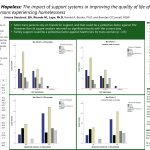 Click on image to expand poster
Click on image to expand poster
Welcome/Opening Plenary
Welcome and Opening Remarks:
Recording: https://www.youtube.com/watch?v=DJENQJSn54g
- Norweeta Milburn, PhD, Director, CHIPTS Development Core
- Steve Shoptaw, PhD, Director, CHIPTS Administrative Core
Conference Facilitator and Announcements:
- Dallas Swendeman, PHD, Co-Director, CHIPTS Development Core
Opening Plenary:
Recording: https://www.youtube.com/watch?v=sseFDnlZ1oo
Gary W. Harper, PhD, MPH, Professor, Health Behavior and Health Education, University of Michigan School of Public Health.
Presentation Title: Promoting resistance and resilience for holistic health: The power of LGBTQIA+ youth
Presentation Summary: N/A
Panel Discussions
Panel 1: PrEP with Gay and Bisexual Men
Recording: https://www.youtube.com/watch?v=sJicMGWEKRw
Panel Presentations:
1. Correlates of sexual contact, COVID testing and comfort attending sexual venues during the COVID-19 pandemic in a global sample of gay, bi-sexual, and other men who have sex with men
- Juan C. Jauregui, MSW, MPH, Doctoral Student
Slides: Download here
Summary: The presentation describes how gay social and sexual venues are important targets for HIV prevention engagement and how GBMSM continued to remain connected through gay geosocial networking apps throughout the pandemic. The presentation examines the impact of COVID-19 on GBMSM’s social and sexual venue attendance.
2. Using PrEP is being part of a larger movement: Additional individual and community level benefits of PrEP use among Latino gay and bi-sexual men
- Martin Santillan Jr.
Slides: Download here
Summary: The presentation examines the additional benefits of using PrEP specifically among Latino GBM PrEP users. Semi-structured interviews were conducted with participants to identify feelings and emotions experienced, plus any additional benefits gained from using PrEP.
Panel 2: HIV and Substance Use
Recording: https://www.youtube.com/watch?v=FwlrEGI83wU
Panel Presentations:
Panel discussant: Pamina M. Gorbach, MHS, DRPH Global HIV Director, CHIPTS Co-Director, UCLA Center for AIDS Research Program on Biobehavioral Epidemiology and Substance Use.
1. Sexual risk among pregnant women at risk of HIV infection in Cape Town, South Africa: What does alcohol have to do with it?
- Amanda P. Miller, PhD, MSc
Slides: Download here
Summary: The presentation focused on alcohol use and HIV describing the interrelated public health issues associated with adverse health outcomes for the mother and fetus. The presentation examined associations between reported alcohol use and HIV risk behaviors among pregnant women in Cape Town, SA
Panel 3: PrEP with Women
Recording: https://www.youtube.com/watch?v=ntneb3UUrJs\
Panel Presentations:
1. Examining interest in HIV pre-exposure prophylaxis delivery modalities among Ghanaian immigrant women in the US
- Gloria Aidoo-Frimpong, MA, MPH, PhD Candidate and David Adzrago, PhD(C), MSW, MPhil, PhD Candidate
Slides: Download here
Summary: The presentation objective was to examine factors associated with willingness to use PrEP delivery methods (i.e., daily oral pill, injectable, microbicide gel, vaginal ring, subdermal implant, vaginal film) among Ghanaians – a subgroup of African immigrants.
2. I want to see what that’s about: Black women’s insights on accessing PrEP via a telehealth app
- Drew Mack, BSc, Medical Student
Slides: Download here
Summary: The presentation discussed the use of qualitative interviews to explore Black women’s’ perception of using telehealth through an app and using telehealth to access Pre-Exposure Prophylaxis.
3. Piloting teleprep information sessions: An implementation strategy to increase PrEP awareness and optimize PrEP uptake among Latina Cisgenders women
- Dilara K. Üsküp, PhD, PhD and Omar Nieto, BS
Slides: Download here
Summary: The presentation discusses a pilot that aims to use an implementation strategy to increase PrEP awareness and optimize PrEP uptake among Latina cisgender women (LCW) through use of PlushCare. PlushCare is a stand-alone telemedicine “app” that exclusively provides virtual/remote delivery of clinical services, including PrEP.
Panel 4: People Living with HIV
Recording: https://www.youtube.com/watch?v=c_4z-wt1J8g
Panel Presentations:
1. Developing an online platform to improve social connections for older adults aging with HIV: Lessons learned from multi-site discussion groups
- Karah Greene, MSW
Slides: Download here
Summary: The presentation discusses the lessons learned regarding the technological barriers encountered during the facilitation of focus groups with older people living with HIV.
2. HIV stigma is associated with patient-reported outcomes and quality of life among Black sexual minority men living with HIV
- Chenglin Hong, MSW, MPH, PhD Candidate
Slides: Download here
Summary: The presentation examines the effect of HIV stigma, which might be pronounced among Black sexual minority men living with HIV due to the Intersectionality and multiple minority stressors. Findings underscore the critical associations between HIV stigma and patient-reported mental health outcomes and quality of life.
3. How does payment shape research participation decisions? Results from a national survey of people living with HIV
- Andrea. N. Polonijo, PhD, MPH
Slides: N/A
Summary: Payment for participation in HIV research is a common practice, yet little is known about how payment affects individuals’ research participation decisions. Using data from a U.S. national survey of people living with HIV (N=292), we examined sociodemographic differences in (a) attitudes toward payment for research participation, (b) perceptions of study risk based on payment amount, and (c) preferred forms of payment. We find payment may influence prospective HIV research participants’ risk–benefit calculus and participation, and that a onesize-fits-all approach to payment could differentially influence participation among distinct sociodemographic groups.
Panel 5: Youth and HIV
Recording: https://www.youtube.com/watch?v=NOJdR_ioWIA
Panel Discussant: Sabrina L. Smiley, PhD, MPH
Panel Presentations:
1. Alcohol misuse during the COVID-19 stay at home orders among youth at risk or living with HIV: A study in Los Angeles and New Orleans
- Roxana Rezai, MPH, Doctoral Student
Slides: Download here
Summary: The presentation discusses marginalized subgroups such as sexual and gender minorities, youth living with HIV, and youth experiencing housing insecurity are particularly susceptible to alcohol use and misuse. The study mentioned examines important factors linked to alcohol misuse during COVID-19 stay-at-home orders in a sample of marginalized youth and young adults at-risk or living with HIV in Los Angeles, CA and New Orleans, LA.
2. Violence experiences are associated with HIV transmission risk over one year among a prospective sample of sexual minority adolescents in the United States
- Joshua A. Rusow, PhD, MSW
Slides: Download here
Summary: The presentation examines mental health symptomology, minority stress experiences, and interpersonal violence as a potential contributing factor to HIV transmission risk behaviors over one year among sexual minority adolescence.
3. Impact of resilience, social support, and healthcare empowerment on HIV care engagement and viral suppression among young Black sexual minority men with HIV in the US
- Erik Storholm, PhD and Wilson Vincent, PHD
Slides: Download here
Summary: The presentation examined the associations of multiple latent predictor variables known to be related to HIV outcomes such as socioeconomic distress, intimate partner violence, depression, resilience, and HIV related social support with HIV care engagement among. The presentation discusses test whether healthcare empowerment mediates the impact of these latent predictor variables have HIV care engagement.
Event Description
The 2021 CHIPTS HIV Next Generation Virtual Conference is this upcoming Friday, January 22, 2021 from 9:00 AM – 1:30 PM. The conference is VIRTUAL and FREE to attend. Access the conference recap with opening remarks, open plenary, and panel discussions: https://chipts.ucla.edu/features/chipts-2021-hiv-next-generation-virtual-conference-recap/
The conference is organized to support the next generation of HIV researchers and service providers who are working towards an end to HIV/AIDS through networking and sharing visions for future priorities. The theme of this year’s conference is “Living with Pandemics: Challenges and Opportunities for HIV Prevention and Treatment.” The conference featured oral and poster presentations by faculty, student and emerging researchers from various institutions.
Welcome/ Opening Plenary
Welcome and Opening Remarks:
Recording: https://www.youtube.com/watch?v=p8ppSD7iTFI
- Norweeta Milburn, PhD, Director, CHIPTS Development Core
- Steve Shoptaw, PhD, Director, CHIPTS Administrative Core
Conference Facilitator and Announcements:
- Dallas Swendeman, PHD, Co-Director, CHIPTS Development Core
Opening Plenary:
Recording: https://www.youtube.com/watch?v=mejrcPhf6_o
Judith S. Currier, MD, MSc, Chief, UCLA Division of Infectious Disease
Presentation Title: Lessons learned from COVID-19
Presentation Summary: N/A
Plenary Discussions
Panel 1: COVID-19 and HIV
Panel Presentations:
1. Leveraging telehealth to promote access to HIV primary care among persons living with HIV in LAC during COVID-19
- Angela Castillo, MA
Slides: Download here
Recording: https://www.youtube.com/watch?v=acLV1j-4850
2. Joteria mentality: A social media strategy to clap back at COVID 19
- Alejandro Chavez and Charlie De Lira-Zepeda
Slides: Download here
Recording: https://www.youtube.com/watch?v=fxpjCB8zkyA
3. Testing an educational visual aid to increase knowledge and adherence to pre-exposure prophylaxis (PrEP) among at-risk youth during the COVID-19 pandemic
- Joan Christodoulou, PhD, Disha Nangia, and Elizabeth Shaw
Slides: Download here
Recording: https://www.youtube.com/watch?v=6U9Dqq4N-ao
Panel 2: HIV Prevention and Treatment Among MSM
Panel Presentations:
1. Examining geographical differences in the HIV care cascade among men who have sex with men in Mexico
- Angel Algarin, MPH, PhD
Slides: Download here
Recording: https://www.youtube.com/watch?v=tHl1GD-oF3Y
2. “That’s kind of like the big struggle right now is can we get PrEP?” Facilitators and barriers to PrEP uptake among active duty gay and bisexual males
- Raiza Beltran, MPH, PhD
Slides: Download here
Recording: https://www.youtube.com/watch?v=8S1Jc6MDtQg
3. Sexually transmitted infection testing and associated factors among men who have sex with men in China
- Chenglin Hong, MSW, MPH, PhD
Slides: Download here
Recording: N/A
Panel 3: Programs and Interventions for HIV Prevention
Panel Presentations:
1. Justicia une a nuestras mujeres trans y oficiales de policías hacia la salud (JUNTOS:—“together”)
- Joanna Lizbeth Barreras, PhD, MSW
Slides: Download here
Recording: https://www.youtube.com/watch?v=TCBHpcMrryA
2. Differences in sexual health communication: The use of latent class analysis to inform HIV intervention tailoring for young black women
- Jaih Craddock, PhD, MSW, MA
Slides: Download here
Recording: https://www.youtube.com/watch?v=px3VKegtcIk
3. The State of LGBT health care access in Orange County: Health care and mental health experiences and among lesbian, gay, bisexual and transgender (LGBT) populations in Orange County
- Austin Nation, PhD, RN, PHN, Aleiza Ambalada, Jonathan Pelayo, and Mathew Trevino, BSN, RN
Slides: Download here
Recording: N/A
Panel 4: Ending the HIV Epidemic Supplement Projects (UCLA CHIPTS)
Panel Presentations:
1. Regional response to HIV eradication efforts in California counties
- Elena Rosenberg-Carlson, MPH
Slides: Download here
Recording: https://www.youtube.com/watch?v=6pwHAS2jXFI
2. Technology-based PrEP delivery and retention services for priority populations in Los Angeles County
- Omar Nieto, BA
Slides: Download here
Recording: https://www.youtube.com/watch?v=eaPapEV_dkE
3. Preparing for long-acting injectable treatment for HIV in Los Angeles
- Oluwadamilola Jolayemi, MSc
Slides: Download here
Recording: https://www.youtube.com/watch?v=KYY8ATjXgYs

